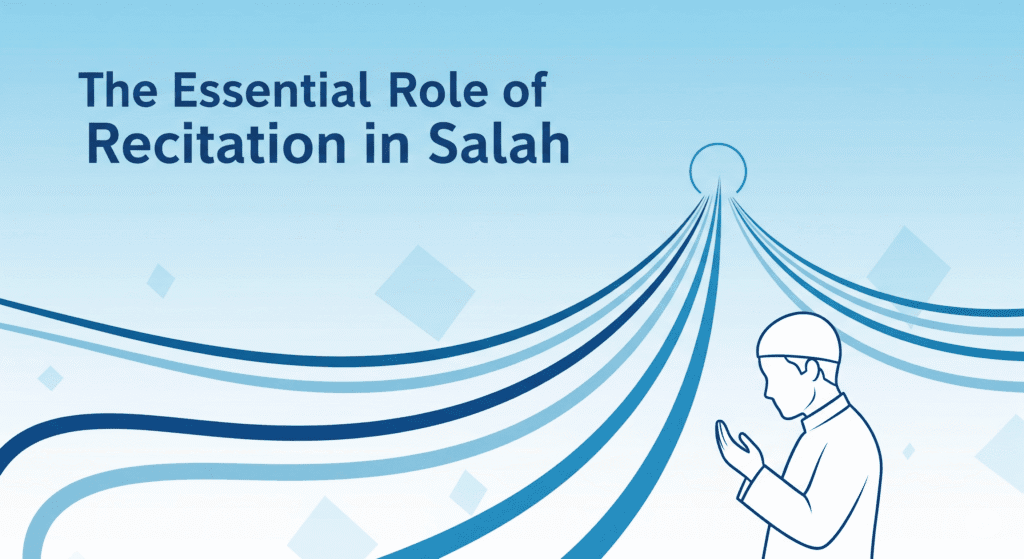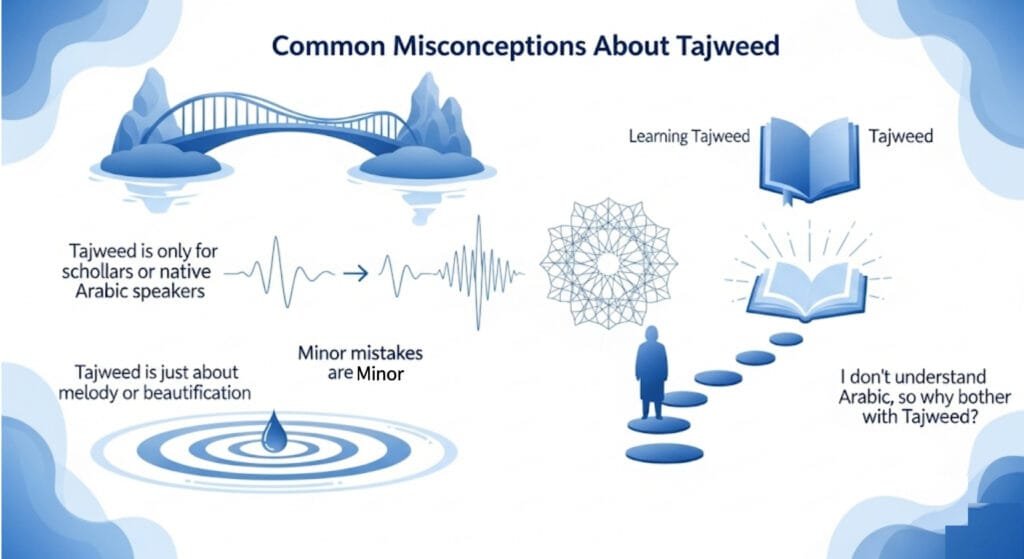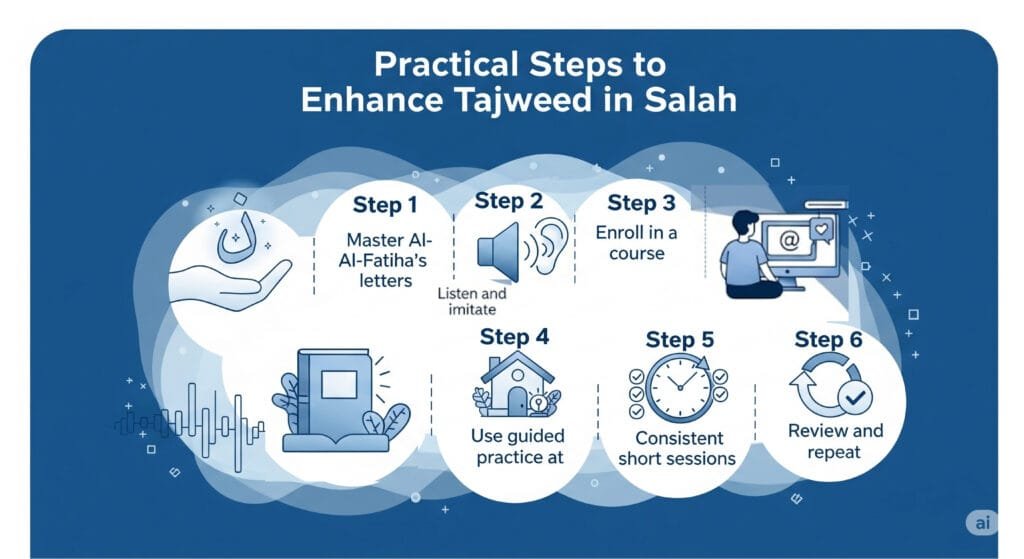Starting With The Name Of Almighty Allah
Have you ever stood in prayer, reciting Surah Al-Fatiha, and wondered if your pronunciation truly honors the words of Allah? In the quiet moments of Salah, where each utterance connects us to the Divine, questions like “Is tajweed important in prayer?” often arise. Many Muslims wonder whether perfecting recitation rules is a must or simply a recommended enhancement. We will explore whether tajweed is mandatory for Salah or if it serves as a deeper, optional pursuit. Drawing from Islamic scholarship and guidance, we aim to clarify this and inspire a more meaningful connection with the Quran during worship.
What Exactly Is Tajweed and Why Does It Matter?

Tajweed is the precise art of reciting the Quran, ensuring each letter emerges from its correct point of articulation with the right attributes and rhythm. It’s not just about sounding melodious; it’s about preserving the Quran’s integrity exactly as it was revealed. For instance, mastering tajweed rules like makharij (points of articulation) and sifat (letter characteristics) prevents distortions that could alter meanings—imagine how a slight shift might turn “qalb” (heart) into a completely different word. The Quran itself emphasizes a deliberate, measured recitation:
“And recite the Qur’an in slow, measured rhythmic tones.”
(Surah Al-Muzzammil 73:4)
This verse highlights why believers often ponder whether tajweed is compulsory. For a thorough breakdown of tajweed principles and importance, see our detailed guide “What is Tajweed in Quran? Tajweed Principles & Importance”. Accurate recitation not only safeguards meaning but also enriches the spiritual experience of reading the Quran.
For those who wish to go beyond theory, enrolling in a Tajweed course online can give you the structure and practice needed to apply these principles correctly in your daily Sal
The Essential Role of Recitation in Salah

Salah, the pillar of Islam, requires certain recitations—most notably, Surah Al-Fatiha in every rak’ah. The Prophet Muhammad (peace be upon him) emphasized this:
“There is no prayer for the one who does not recite the Opening of the Book (Al-Fatiha)”
(Sahih al-Bukhari)
This illustrates that reciting clearly is fundamental. However, does it mean every aspect of tajweed must be perfect for the prayer to count?
In essence, correct recitation demands clarity and precision to avoid altering any word’s meaning. For example, mispronouncing letters in a way that changes words, like saying “sirat” instead of “sirāt” in Al-Fatiha could distort the verse’s sense. Scholars agree that basic pronunciation accuracy is required to preserve the prayer’s validity. Debate centers on whether perfecting every elongation or nasalization is obligatory. Generally, minor slips (like slight variations in madd or ghunnah) do not invalidate Salah, but major mistakes that change meaning do. This balanced view reassures beginners while underlining the importance of focusing on clear, correct recitation.
Beginners often find this reassuring, but it also shows the value of consistent practice. If you want to gradually refine your recitation, you can learn Quran with Tajweed through guided lessons that focus on both accuracy and spiritual depth.
Tajweed Is Mandatory or Recommended?

Islamic jurists have long discussed this topic, and opinions vary by school of thought. Many in the Hanafi and Maliki school of thoughts say that while perfect tajweed beautifies recitation, it is not strictly required for the prayer’s validity as long as the Arabic words are understandable and meanings intact. In contrast, the Shafi‘i and Hanbali schools place greater emphasis on specific rules, holding that neglecting certain tajweed aspects can affect validity if it leads to distortion.
Renowned scholar Ibn al-Jazari asserted,
“Applying Tajweed is an issue of absolute necessity; whoever doesn’t apply Tajweed to the Qur’an, he is a sinner.”
This statement highlights the moral significance of tajweed. However, contemporary scholars note that only significant errors—such as confusing a hamza with an ‘ayn or skipping an elongation that changes sense—truly compromise a recitation. Minor deviations typically do not. The key is that major tajweed errors should be avoided to maintain correctness, while striving for ideal recitation is viewed as virtuous.
In practical terms, this means the foundational rules of pronunciation are required to keep the prayer valid, but the finer details of tajweed are strongly recommended for excellence. If you’re curious about reciting the Quran with tajweed outside of prayer, see our post “Is It Compulsory to Recite Quran with Tajweed?” which expands on daily practice and obligations.
For learners who want structured guidance that fits into their schedules, an Online Tajweed course can make this process easier and more effective, especially when supported by experienced instructors.
Insights from Quran and Hadith
The Qur’an and Sunnah emphasize the importance of careful, deliberate recitation. Allah commands, “And recite the Qur’an with measured recitation (tarteel)” (Surah Al-Muzzammil 73:4), verse mentioned earlier, highlights clarity and mindfulness in pronunciation. Similarly, Allah S.W.T also says:
“And those who disbelieve say, ‘Why was the Qur’an not revealed to him all at once?’ Thus [it is] that We may strengthen thereby your heart. And We have spaced it distinctly”
(Surah Al-Furqan 25:32)
The gradual revelation and its distinct arrangement signify the divine wisdom of delivering the Qur’an in a manner that nurtures reflection and accuracy. The Prophet ﷺ also instructed, “Beautify the Qur’an with your voices”
(Sunan Abi Dawood 1468)
Further underlining that recitation should be thoughtful, precise, and spiritually moving.
The Prophet Muhammad (peace be upon him) specifically encouraged beautifying the Quran with one’s voice. He said,
“Beautify the Quran with your voices, for the beautiful voice increases the beauty of the Quran.”
(Sunan an-Nasa’i)
This hadith motivates us to learn tajweed for the sake of beauty and devotion. Another narration from ʿĀ’ishah (may Allah be pleased with her) explains the rewards:
“The one who is proficient in the recitation of the Quran will be with the honorable and obedient scribes (angels), and he who recites the Quran and finds it difficult, doing his best to recite it in the best way possible, will have two rewards.”
(Sahih al-Bukhari 4937)
This shows that Allah rewards both those who master the Quran and those who try their best despite difficulty. It underscores that effort in tajweed is rewarded, even if one is not yet perfect. In summary, the Quran and Hadith emphasize sincerity, carefulness, and improvement in recitation, encouraging us to refine our tajweed while assuring us that Allah honors our efforts. The wisdom behind careful and deliberate recitation is further explained in The Importance of Tajweed And Its Purpose In Quran Reading, highlighting how Tajweed protects meaning and strengthens spiritual focus.
If you are aiming to practice this Prophetic guidance, joining tajweed lessons online can help you internalize these recitation habits in a structured way.
Benefits of Tajweed in Salah

Applying tajweed transforms Salah from routine recitation into a profound act of worship. It enhances focus when you deliberately pronounce each letter, you naturally concentrate on the words’ meanings. This mindfulness can make your prayer more engaging. For instance, elongating “ar-Raḥmān ar-Raḥīm” with proper madd often helps one truly feel the weight of Allah’s mercy.
Spiritually, correct recitation brings tranquility. Beautiful, measured recitation aligns with the Prophet’s practice and can induce a calm in the heart, as Allah says:
“Verily, in the remembrance of Allah do hearts find rest.”
(Surah Ar-Ra’d 13:28)
On a practical level, stronger tajweed also builds confidence: when you lead prayer or recite aloud, clear pronunciation ensures others hear the correct words, avoiding confusion.
Here are some key benefits:
- Heightened Focus:
Concentrating on tajweed means paying close attention to each word, deepening your connection to its meaning.
- Spiritual Calm:
A melodious, precise recitation can make the mind and heart more tranquil during prayer.
- Clarity of Meaning:
Correct pronunciation prevents miscommunication of Quranic words, preserving the message.
- Confidence in Prayer:
As you improve, leading prayer or reciting aloud becomes easier and more assured.
- Eternal Reward:
Striving for excellence in recitation multiplies reward, as indicated by the hadith about proficiency narrated above (Sahih al-Bukhari 4937).
For a more in-depth look at these advantages, see our blog “Benefits of Reading Quran with Tajweed”. It explores how tajweed enriches both personal devotion and public recitation.
In addition to spiritual calm, many learners find that when they learn Quran Online with Tajweed, they not only improve their Salah but also deepen their day-to-day relationship with the Qur’an.
Common Misconceptions About Tajweed

Several myths can cause hesitation in learning tajweed. Let’s clear up a few:
- Tajweed is only for scholars or native Arabic speakers:
In reality, tajweed is meant for everyone who reads the Quran. Modern resources—including online courses and tutors at Najam Academy—make learning accessible for non-Arabs and beginners alike.
- Tajweed is just about melody or beautification:
While a beautiful tone is welcomed, tajweed’s core purpose is accuracy. Proper articulation naturally results in a clearer, more pleasing recitation.
- Minor mistakes are no big deal:
It’s true that small slips usually don’t invalidate prayer, but consistently ignoring rules can lead to incorrect habits. Just as the Prophet (PBUH) encouraged learning and teaching the Quran, striving for accuracy helps preserve the words for future recitation.
- I don’t understand Arabic, so why bother with Tajweed?
Even without full understanding, learning tajweed ensures you’re pronouncing each letter correctly. This honors Allah’s words and also aids in learning the Arabic language over time.
In short, the basic rules of recitation must be followed for valid Salah, but improving your tajweed is always encouraged and beneficial. A common source of confusion is clarified in What is Tajweed and Makhraj? Difference Between Makhraj And Tajweed, which explains how articulation points differ from the broader rules of recitation.
Practical Steps to Enhance Tajweed in Salah

You don’t need drastic changes to see progress. Small, consistent steps can greatly improve your tajweed:
- Master Al-Fatiha’s letters:
Since it’s recited every rak’ah, practice the difficult letters in Al-Fatiha (like “ḍād”, “ṭā’”, “ṣād”, “ā’in”) at their correct makhārij (points of articulation).
- Listen and Imitate:
Spend time listening to renowned reciters (e.g. Sheikh Mishary Rashid Alafasy or Sheikh Abdul Rahman al-Sudais). Mimic their rhythm and pronunciation. This helps internalize tajweed rules.
- Enroll in a course:
Najam Academy offers flexible online Tajweed courses tailored to different levels. Such courses provide structured lessons and expert supervision, covering practical rules like idgham (merging) and waqf (stopping) and more.
- Use Duided Practice at Home:
If you prefer self-study, check “How to Learn Quran with Tajweed at Home” for tips on effective learning. It suggests creating a dedicated recitation space, using apps for drills, and setting achievable goals.
- Consistent Short Sessions:
Rather than occasional long sessions, try short daily practice (10–15 minutes) focusing on trouble spots. Recording yourself can highlight mistakes to fix.
- Review and Repeat:
Repetition is key. Revisit challenging verses regularly until they become second nature. Over time, these improvements will reflect in your prayers.
Learners facing pronunciation difficulty, time constraints, or motivation issues will find practical solutions in Challenges in Learning Tajweed and Practical Ways to Overcome Them, which addresses common obstacles step by step.
By integrating these practices into your routine, you’ll gradually notice smoother and more confident recitation. Whether through Najam Academy’s courses or self-study resources, continuous practice will yield great rewards in your worship. To strengthen pronunciation accuracy in prayer, studying, “What Is Makhraj In Tajweed? Makharij Of Arabic Letters (Articulation)” helps ensure each letter is produced from its correct point of origin.
Final Thoughts: Perfecting Your Prayers
In summary, while mastering every tajweed rule isn’t strictly necessary to avoid invalidating your prayer, the fundamental principles of clear and correct recitation are crucial. Avoiding major mistakes (those that change meaning) is required to maintain Salah’s validity. Beyond that, embracing full tajweed enriches your connection with the Quran and brings spiritual benefits.
The journey of improving your tajweed is a valuable one. Remember the Prophet’s guidance:
“The best among you are those who learn the Quran and teach it.”
(Sahih al-Bukhari, Hadith 5027)
Let this inspire you to refine your recitation. Whether you begin with mastering a few pronunciations or enroll in Najam Academy’s tajweed courses, every step toward better recitation is rewarded.
Enhancing your recitation not only upholds an important Sunnah but also transforms your prayers into heartfelt remembrance of Allah. Start today, and experience how perfecting Allah’s words in your Salah brings peace, confidence, and closeness to your Creator.




